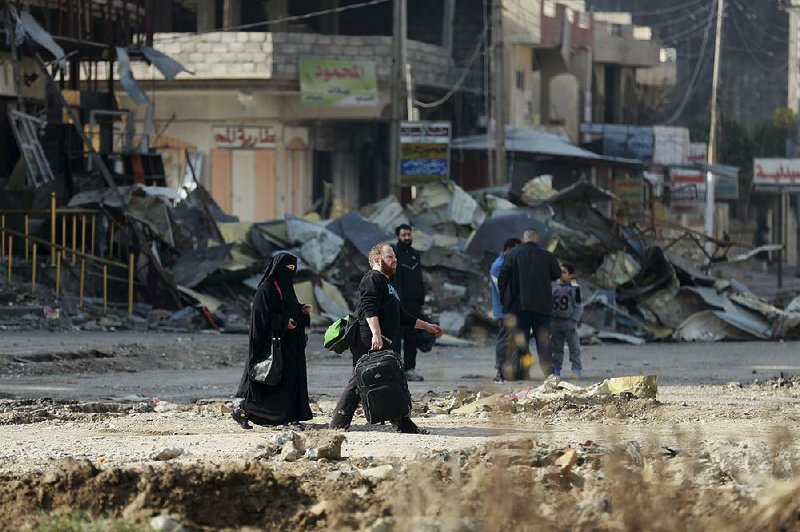BAGHDAD -- Iraqi troops in Mosul have battled their way to the Tigris River running through the center of town, marking a milestone in the nearly 3-month-old offensive aimed at reclaiming the northern city from Islamic State militants.
Lt. Gen. Abdul-Amir Rasheed Yar Allah said special forces reached the river late Sunday and now control the eastern side of one of the city's five bridges, all of which have been disabled by U.S.-led airstrikes in support of the offensive.
Prime Minister Haider al-Abadi said the recent advances were "big achievements for all the factions of the Iraqi security forces."
"Thank God, our forces are liberating neighborhood after neighborhood," he said Monday in a joint news conference in Baghdad with his Jordanian counterpart.
In Mosul, Maj. Gen. Sami al-Aridi of the special forces said troops were battling the Islamic State in the Baladiyat and Sukar neighborhoods after driving the extremists out of Muthana and Rifaq the day before. He said Iraqi forces repelled an overnight attack, killing 37 militants, without elaborating.
The Mosul offensive resumed last month after a two-week lull due to stiff Islamic State resistance and bad weather. Since then, Iraqi forces have recaptured new areas in the city's eastern half.
Mosul is Iraq's second-largest city and the extremist group's last major urban bastion in the country. Iraqi special forces have done most of the fighting in the city, while Iraqi troops have advanced on it from different sides. Kurdish forces and Shiite militias have driven the extremists from surrounding areas and sought to cut off militant escape routes.
Mosul fell to the Islamic State in the summer of 2014, when the extremists swept across much of northern and western Iraq. Iraqi forces have gradually retaken most of that territory over the past three years, and outside of Mosul the militants are largely confined to smaller towns and villages.
In Baghdad, the country's oil minister said Monday that Iraq's crude exports from the country's southern ports inched up last month to 3.5 million barrels per day for the first time, lauding his ministry's plans and the work of a handful of international companies developing Iraq's prized southern fields.
Jabar Ali al-Luaibi described December exports as the "highest and unprecedented" so far. November daily exports from government-controlled fields in central and southern Iraq stood at 3.4 million barrels.
The ministry's statement didn't release figures of crude exports through Iraq's northern pipeline network run by the semi-autonomous Kurdish region, which typically average about 600,000 barrels a day.
The heart of the country's oil industry is in the mainly Shiite central and southern parts of Iraq that were spared the June 2014 blitz by the Islamic State group, which seized large stretches of the country's north and west, including oil fields and facilities.
Al-Luaibi underlined that the December levels will not affect Iraq's commitment to cut daily production as per the OPEC deal aiming to lower output for a six-month period by 1.2 million barrels per day to prop up plummeted oil prices, starting from Jan. 1. The 14-member group is supposed to produce 32.5 million barrels per day. Non-OPEC nation also agreed to pare an additional 600,000 barrels a day off their production.
Iraq, OPEC's second-largest producer, already started measures to reduce output by 200,000 barrels a day to 4.3 million barrels since early this year, in accordance with Iraq's share in the deal, the oil minister added, expressing his satisfaction that current oil prices hover around $53 per barrel.
Iraq, where oil revenue makes up nearly 95 percent of the budget, has been reeling under an economic crisis since late 2014, when oil prices began their descent from a high of above $100 a barrel. The 2014 onslaught by The Islamic State exacerbated the situation, forcing Iraq to divert much of its resources to its 2-year old costly war.
Iraq's 2017 budget stands at about 100.67 trillion Iraqi dinars, or nearly $85.17 billion, running with a deficit of 21.65 trillion dinars, or about $18.32 billion. That's based on an oil price of $42 per barrel and a daily export capacity of 3.75 million barrels from all of Iraq.
Iraq holds the world's fourth-largest oil reserves, with some 143.1 billion barrels.
A Section on 01/10/2017


